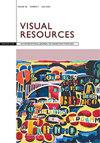The Image of Collaboration: Mediation and Enervation under Lockdown
IF 0.1
0 ART
引用次数: 1
Abstract
Throughout the pandemic and in conditions of ‘lockdown’, in which the authors could not meet in person, Alexandra Antonopoulou and Eleanor Dare adapted their long-term collaborative writing project, The Phi Books (2008–), to the constraints of pandemic quarantine, in the second lockdown deploying their own chatbot and AI image generator as new collaborators. Given the complexity of such a mediated experience, in which fears around surveillance, corporate control, glitch and signal loss (not to mention illness) have been consistently present, how might we theorize the encounters and complex processes of mediation we experienced online, as writers and academics but also as friends? What, if anything, have we learnt from our collaboration being mediated by one or two corporate platforms? This article elucidates the author’s patterns of interpretation and resistance as mediatized and informed by embodied experiences. It also discusses the role of third-party agents, which the authors term ‘Coagulagents’ (coagulant and agents), serving to destabilize or deterritorialize the familiar presumptions of their work.协作的形象:封锁下的调解与创新
在整个疫情期间,在作者无法亲自会面的“封锁”条件下,Alexandra Antonopoulou和Eleanor Dare将他们的长期合作写作项目the Phi Books(2008–)适应了疫情隔离的限制,在第二次封锁中,他们部署了自己的聊天机器人和人工智能图像生成器作为新的合作者。鉴于这种调解经历的复杂性,对监控、公司控制、故障和信号丢失(更不用说疾病)的恐惧一直存在,我们如何将我们作为作家和学者以及朋友在网上经历的调解遭遇和复杂过程理论化?在一两个企业平台的调解下,我们从合作中学到了什么?这篇文章阐述了作者的解释和抵抗模式,这些模式是由具体的经验所中介和告知的。它还讨论了第三方试剂的作用,作者称之为“凝聚剂”(凝聚剂和试剂),用于破坏或阻止他们工作中常见的假设。
本文章由计算机程序翻译,如有差异,请以英文原文为准。
求助全文
约1分钟内获得全文
求助全文

 求助内容:
求助内容: 应助结果提醒方式:
应助结果提醒方式:


